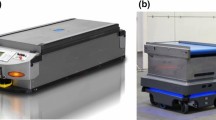Abstract
Additive Manufacturing (AM) machines are a highly flexible manufacturing capability capable of producing a wide range of products. One feature that enables this is the ability to change materials in a relatively short time. For example, Fused Deposition Modelling (FDM) printers can be quickly and easily reconfigured to print in different materials such as PLA, ABS, and Nylon. Facilities that, therefore, employ Additive Manufacturing (AM) machines have the underlying capability to be flexible and responsive to diverse product demand. However, as jobs require different machine configurations for fabrication, methods need to be developed to assist facilities in deciding whether to and when to transition machines from one type of production to another to maximise overall system performance. In this paper, we explore how agent-based control can provide flexibility and responsiveness in manufacturing facilities. A model of a single fabrication workshop was created using AnyLogic, comprising multiple machines and incoming jobs of varying required machine configuration. The modelling shows responsiveness to spikes in demand when machines are able to request a change in configuration, although the penalties associated with reconfiguration cause poor performance when changes occur frequently. When not willing to change configuration, spikes in demand cause the system to become unstable and unable to meet changes in demand.
Access this chapter
Tax calculation will be finalised at checkout
Purchases are for personal use only
Similar content being viewed by others
Notes
- 1.
For example, workshops, makerspaces, libraries, and hobbyists.
References
Ma, A., Nassehi, A., Snider, C.: Anarchic manufacturing. Int. J. Pro. Res. 57(8). https://doi.org/10.1080/00207543.2018.1521534
Sculpteo.: The State of 3D Printing 2021
Gopsill, J., Goudswaard, M., Snider, C., Johns, J., Hicks, B.: Achieving responsive and sustainable manufacturing through a brokered agent-based production paradigm. Smart Innov. Syst. Technol. 262 (2022). SIST: 24-33
Qiao, B., Zhu, J.Y.: Agent-based intelligent manufacturing systems: a state-of-the-art survey. Nanjing Hangkong Hangtian Daxue Xuebao/J. Nanjing Univ Aeronaut Astronaut. 33(1), 1 (2001)
Lu, Y., Xu, X., Xu, J.: Development of a hybrid manufacturing cloud. J. Manuf. Syst. 33(4), 551–66 (2014). https://doi.org/10.1016/j.jmsy.2014.05.003
Darmoul, S., Pierreval, H., Hajri-Gabouj, S.: Using ontologies to capture and structure knowledge about disruptions in manufacturing systems: an immune driven approach. In: IEEE International Conference on Emerging Technologies and Factory Automation, ETFA (2011)
Goudswaard, M., Gopsill, J., Ma, A., Nassehi, A., Hicks, B.: Responding to rapidly changing product demand through a coordinated additive manufacturing production system: a COVID-19 case study. In: 9th Manufacturing Engineering Society International Conference (MESIC 2021) (2021)
Caridi, M., Cavalieri, S.: Multi-agent systems in production planning and control: an overview. Prod Plan Control 15(2), 106–118 (2004)
Guo, Q., Zhang, M.: A novel approach for multi-agent-based Intelligent manufacturing system. Inf. Sci. (Ny) 179(18), 3079–3090 (2009)
Tang, H., Li, D., Wang, S., Dong, Z.: CASOA: an architecture for agent-based manufacturing system in the context of industry 4.0. IEEE Access 6, 12746–12754 (2017)
Oluwatosin, H.S.: Client-server model. IOSR J. Comput. Eng. 16(1), 57–71 (2014)
Khan, Z.A., Khan, M.T., Ul Haq, I., Shah, K.: Agent-based fault tolerant framework for manufacturing process automation. Int. J. Comput. Integr. Manuf. 32(3), 268–277 (2019). https://doi.org/10.1080/0951192X.2019.1571235
Ma, A., Nassehi, A., Snider, C.: Anarchic manufacturing: implementing fully distributed control and planning in assembly. Prod. Manuf. Res. 9(1), 56–80 (2021). https://doi.org/10.1080/21693277.2021.1963346
Author information
Authors and Affiliations
Corresponding author
Editor information
Editors and Affiliations
Rights and permissions
Copyright information
© 2022 The Author(s), under exclusive license to Springer Nature Singapore Pte Ltd.
About this paper
Cite this paper
Obi, M., Snider, C., Giunta, L., Goudswaard, M., Gopsill, J. (2022). Coping with Diverse Product Demand Through Agent-Led Type Transitions. In: Jezic, G., Chen-Burger, YH.J., Kusek, M., Šperka, R., Howlett, R.J., Jain, L.C. (eds) Agents and Multi-Agent Systems: Technologies and Applications 2022. Smart Innovation, Systems and Technologies, vol 306. Springer, Singapore. https://doi.org/10.1007/978-981-19-3359-2_24
Download citation
DOI: https://doi.org/10.1007/978-981-19-3359-2_24
Published:
Publisher Name: Springer, Singapore
Print ISBN: 978-981-19-3358-5
Online ISBN: 978-981-19-3359-2
eBook Packages: Intelligent Technologies and RoboticsIntelligent Technologies and Robotics (R0)




